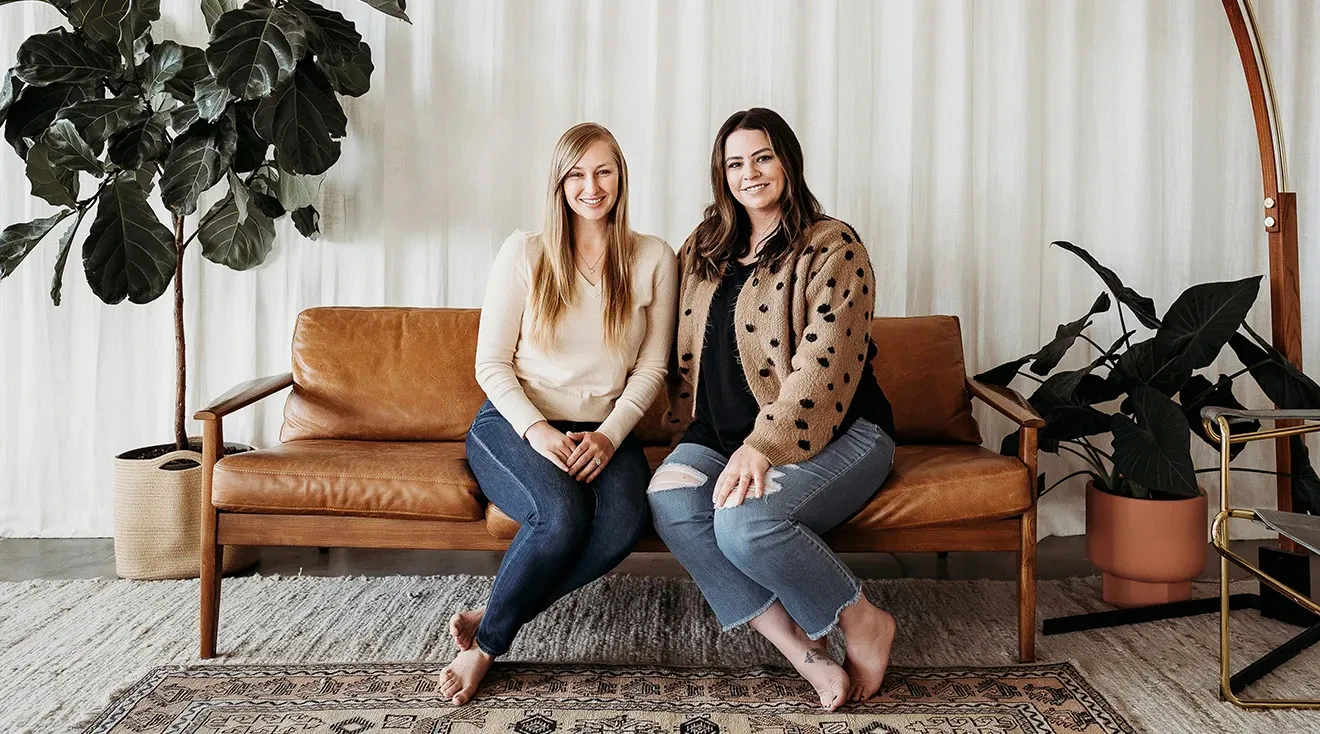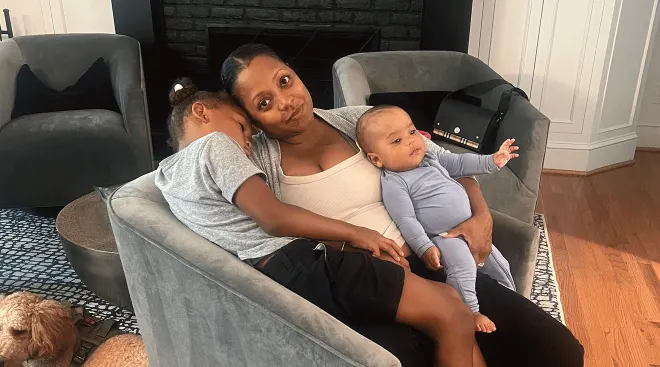Behind-the-Scenes Parenting With the Pros Behind Big Little Feelings
On a mission to provide evidence-based advice to the caregivers of adorable but sometimes erratic toddlers, Kristin Gallant and Deena Margolin are the friends, moms and masterminds behind the mega-popular parenting resource Big Little Feelings. Their online courses have a devoted following, with over 200,000 parents singing their praises, and they’ve amassed a whopping 2.9 million Instagram followers who hang on their words of wisdom.
With empathy and a hearty dose of humor, Margolin, a licensed marriage and family therapist, and Gallant, a maternal and childhood education specialist, get real about the struggles of parenting, from wrangling babies at bedtime to feeding finicky eaters to managing meltdowns (of the toddler and grownup varieties).
The Bump recently chatted with the two mama moguls behind BLF to get the scoop on what’s next for their growing company and score some coveted parenting tips (because we couldn’t not ask these pros!). Here’s what we learned.
The Bump: You launched Big Little Feelings in 2020. In that time, you’ve built it into a robust and trusted resource and community for parents. What’s been the biggest surprise, learning curve, challenge and reward?
Deena Margolin: The last three years have been a whirlwind and a rollercoaster—not just for us, but for so many people. We started BLF in March of 2020, so it was right before the entire world changed. Everyone’s day-to-day radically shifted, and parents and caregivers essentially woke up one day to a whole new reality with their kids. We had no idea COVID would impact the world the way it did, but in hindsight, having a safe, reliable, helpful community for parents was more needed than ever.
With that in mind, the biggest reward is our community… We really and truly feel deeply connected to every single person. It cracks our hearts open and makes all the hard work so worth it.
There are surprises, learning curves and challenges every day—not just as it relates to BLF, but also as women, friends and moms. It’s all a learning curve! We do our best. We believe in ourselves. We believe in each other. We believe in our community. We celebrate the wins, and we keep going.
TB: Deena, you have two kids, and Kristin, you have three. Is there anything you did during your pregnancies to prepare for welcoming a new family member?
DM: It goes without saying that if you already have a child (or children) at home, welcoming a new baby can be a really triggering experience for them. After all, for as long as your toddler can remember, they’ve been the center of your love and attention, right? Now this “new best friend” comes into the scene, and they have to share your attention. It’s a lot, and it can be really hard for them.
For starters, have your toddler meet the new baby in a bassinet or car seat, not Mom or Dad’s arms! It’s best to introduce the new baby when they’re in a neutral space. If the baby is in your arms, seeing that can really trigger the threat that your toddler is being replaced, and that can lead to a lot of big feelings.
Also have the baby “give your toddler a gift” before the baby arrives. It can be small, and doesn’t need to be fancy! This helps reduce the “threat factor” of the new baby, and can help ensure the relationship starts out on a positive note. And have your toddler pick out a gift for the new baby too. This helps foster a sense of control for your toddler—and you know how much toddlers love control!
Kristin Gallant: Whether it’s your first or your third, welcoming a new baby is a whole thing. I don’t think anyone ever feels totally prepared! Before we welcomed our son last year, we decided to bank his cord blood with Cord Blood Registry (CBR). Cord blood banking is a process of collecting potentially life-saving stem cells from the umbilical cord and placenta and storing them for future use. The process was surprisingly straightforward, and it feels good to know that we’ve taken one extra step to protect our family’s health.
TB: Toddlers are fickle (and amazing) creatures, and parenting is tough, exhausting and sometimes frustrating. As parents, do you ever find yourself not following your own BLF advice? What do you do to ground yourself in reality and get back on track?
KG: Of course, nobody is perfect—and nobody “does it right” 100 percent of the time, including us. It’s tempting to scroll through Instagram and see edited, picture-perfect images and think that everyone else is “perfect,” and you’re not. But that’s just not true!
If you’ve taken our online courses or follow us on Instagram, you know we’re big fans of the 80/20 rule: 80 percent of the time you’re doing the whole boundaries-patience-vegetables-consistent bedtime thing, and 20 percent of the time you’re giving yourself a well-deserved, guilt-free break.
We also have moments where we fully lose our cool. It happens to all of us! When you “mess up” or lose your cool in front of your kid, remember that it doesn’t mean you’re a bad parent. It means you’re human. When you lose your cool, you can repair it with your little one by offering an apology, acknowledging their feelings, reinforcing your love and teaching coping skills.
TB: Do you have any parenting mantras you repeat to yourself in particularly difficult moments?
DM: We’re so much harder on ourselves than we’d ever be with any other human being. As parents, we tend to hold ourselves to an unbelievably high standard. In tough moments, we try to look for the small wins and celebrate them. Beating yourself up because your kid ate waffles for two out of three meals that day? Hey, your kid was fed and loved it. Celebrate that!
Another go-to mantra is “I am the best parent for my kid.” The best part about it? It’s true. In those (inevitable) moments that are really hard, reminding yourself that you’re crushing it and that you’re the absolute best parent or caregiver to your little one can help to radically shift your perspective, your energy and your approach.
TB: As your kids get older, the learning curve continues. What lessons have you learned about parenting in the last year alone—and how do you apply those personal growth moments to BLF?
KG: This past year we added a third (amazing) little baby to our family, and the biggest lesson I’ve learned is to let go of the idea that you can be everywhere and be everything for everyone at the same time. It’s been a real balancing act between being there for each child (who are all in very different stages of life and have super-different needs), show up for work fresh off a maternity leave, show up for my marriage and show up for myself. I’ve learned that I can’t be everywhere, and that’s okay. That’s enough. I’ve learned that in certain seasons, you only have so much to give, and whatever that amount is, it’s still so much.
DM: Having two kids under 2 years old has felt like a whirlwind at times. In the past year, I’ve learned to embrace the situations that are really hard for me and that push me to my limits with more compassion. I’ve been able to identify my “trigger” situations—namely kids crying in the car (so overwhelming!) and anytime my kids are rough with each other (my urge is to respond with anger, due to my own childhood experiences). I’ve worked very hard to rewire my response. The more I’ve leaned into understanding why these are hard for me, the more I’m able to have compassion for myself and also mentally prepare for handling these situations with more patience. While I don’t always get it right, I’m doing my best, and that’s what matters. Shout out to all the parents doing the work and changing generational patterns!
TB: What’s the biggest misconception about the terrible twos?
KG: We find that a lot of toddler behavior is incorrectly perceived as “bad behavior,” when in reality it’s totally normal—and, more often than not, it’s actually a sign of healthy development. Tantrums, meltdowns, screaming, kicking, hitting, biting—they’re all common, normal and a sign that your toddler’s development is right on track.
TB: What’s the most common mistake parents make in the heat of a toddler tantrum?
DM: An escalated adult cannot de-escalate an escalated child. When your toddler’s having a meltdown, it’s really tempting to join in on the chaos. But we can promise you that their chaos plus your chaos equals more chaos. Instead, try this four-step process: First, accept them; then see them; [acknowledge] the feeling and then hold the boundary.
Your mid-tantrum script might sound something like, “I hear you really want more iPad time now. It’s okay to feel mad and sad that iPad time is over for today. We will have more iPad time tomorrow.”
Allowing the tantrum doesn’t mean allowing them to have anything they want. They’re allowed to ask, and we’re allowed to hold boundaries. Support them through their upset feelings. And if you do have a moment where you join in on their chaos? That’s fine. We’ve all been there.
TB: Transitions can be really difficult for toddlers—leaving a party, getting ready for bed, walking out the door, etc. What are some tactics parents can take to make the flow from one activity to the next a little smoother and less of a struggle?
KG: A ton of tantrums are triggered by transitions. That’s because toddler brains don’t appreciate being surprised, so ending one thing and starting another can send them into Meltdown City. When it comes to transitions, we have two go-to game plans to help make the process as smooth as possible.
The first is a magical four-step game plan, PREP, which helps ensure your toddler is in-the-know about an upcoming experience that might feel big, new or scary, like an upcoming doctor visit, going to camp for the first time or taking an airplane ride. PREP helps your little one feel calm and confident when the experience actually happens.
You can PREP your little one for just about anything by reading books or watching age-appropriate shows on the topic, walking through exactly what will happen and even dress rehearing the experience together at home before it happens. With PREP, the more details, the better! The when, where, why, how and who are all important and help them feel as safe as possible in the moment.
DM Another game plan we love for managing transitions is called the “timer trick.” For context, neuroscience tells us that time is a concept that toddlers don’t understand, and that their toddler brain craves power and control. The “timer trick" gives them age-appropriate power, and makes the vague concept of time something firm they can understand. First, prep ahead of time: “In two minutes, when our timer goes off, we’ll head to bed.” Next, let them start the timer. “Do you want to push the button? Okay! When it goes off, we’ll know it’s time for bed.” Finally, when it’s time to go, let them press the timer button. “That’s the timer! Do you want to turn it off? Let’s head up to bed.”
Is your toddler still going to have big feelings during some transitions? Absolutely. Remember to “okay” the feeling. The more you can accept their feelings without trying to change them, the more secure and safe you’re helping them feel.
TB: How do you each prioritize one-on-one time with your kids? How does it vary by child?
DM: Toddler brains are still under construction, so they don’t have the ability to say things like “I need you,” “I’m worried” or “I’m feeling frustrated.” Instead, they might show you through physical displays, tantrums or other unwanted behavior. You’ll likely see even more of this during times of change. Starting at a new school? Did you just bring home a new baby? Those are big shifts for your toddler, and they can absolutely lead to an uptick in unwanted behavior.
We encourage trying the “10-minute miracle.” It’s 10 minutes of focused, intentional one-on-one time with your child. You can give this time a special name so that it stands out from the rest of the day, and let your child pick the activity. No phones, no siblings, no criticizing, no correcting—just time for them to soak up your attention and unconditional love. Think of this as proactively filling their “attention tank” with positive attention.
TB: What are the pillars of a successful bedtime with a toddler who instinctively refuses sleep?
DM: No one has more on their to-do list than a toddler at bedtime, right? The nighttime delays can feel endless, and while the list of things “they have to do before bed” is often hilarious and adorable, we’ve all gotten to the “I-need-to-get-the-F-to-bed” stage too.
Next time your toddler is pushing back on going to sleep, create a visible bedtime-routine chart in your house, so that your toddler can actually see what needs to happen next. You can let them be the ones to check off the list or put a sticker on the task once completed, letting them experience some age-appropriate control so that bedtime is (partially!) on their terms. Less pushback, more cooperation. Alo try using bedtime cues: About an hour before bedtime, start to close shades, dim the lights and play soft music. If you do this consistently, their bodies will naturally start to wind down with the cues without them even being aware of it! Also give small choices. When it comes to bedtime, something as simple as “Do you want to wear your blue pajamas or your red pajamas?” or “Do you want to read Goodnight Moon or The Very Hungry Caterpillar before bed tonight?” can help shift from pushback mode into collaboration mode.
TB: What’s your parenting superpower?
KG: I’ve worked very, very, very hard in years and years of therapy to have the ability to stay calm in the most chaotic and triggering moments. The “pause” (stopping before reacting) is my superpower. That said, I can’t cook even a piece of toast, my house is a mess and I’ve given up trying there—so, you know, I’m not perfect!
DM: My superpower is compassion, and seeing mistakes as an opportunity to grow. I grew up with a lot of pressure (both from my environment and from myself) to be successful, and that ultimately led to a case of perfectionism I’ve had to untangle as an adult.
After a lot of work and intention, I now have the superpower to keep my cool when my kids make mistakes, and use my energy to help them learn to problem-solve, build coping skills, be kind to themselves and learn from the situation with compassion, because everyone makes mistakes—it’s part of being human. Mistakes are one of the most helpful ways to grow, especially if we shift perspective to see them as opportunities to learn.
Navigate forward to interact with the calendar and select a date. Press the question mark key to get the keyboard shortcuts for changing dates.





















































